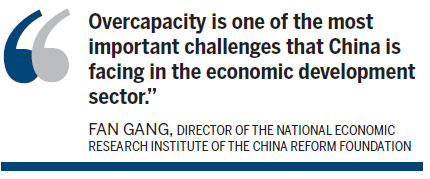'Early warning' on capacity
By Du Juan, Zhao Yinan and Chen Jia (China Daily) Updated: 2014-01-23 09:34
President Xi Jinping stressed that the country will no longer evaluate local government officials' performance by GDP growth alone.
The government also announced guidelines for reducing overcapacity in five industries: steel, cement, electrolytic aluminum, sheet glass and shipbuilding.
The steel industry has been through a prolonged period of losses caused by rising imported iron ore costs and falling steel prices.
Li Xinchuang, head of the China Metallurgical Industry Planning and Research Institute, said the industry should avoid adding further capacity and the government should follow strict procedures to close polluting, low-efficiency steel plants.
In the electrolytic aluminum sector, the capacity utilization rate is as low as 78 to 80 percent, according to the China Nonferrous Metal Industry Association.
Although aluminum capacity was supposed to be cut by 1.9 million metric tons last year, the reality was quite different, and there's still much work to do, said Wan Ling, manager of China nonferrous metals at commodity data firm CRU International Ltd.
Facilities closed
The Ministry of Industry and Information Technology has said that obsolete production lines involving 1,569 companies in the five troubled sectors were shut down in the past year, indicating progress in dealing with overcapacity.
Ou Hong, deputy director of the investment department of the NDRC, said that the government will strive to optimize the role of investment in the country's economic growth this year.
He said the government will invest more in areas where the market isn't fully effective, giving support to environmental protection and technological innovation.
It will speed up formulation of regulations for private capital's participation in sectors including finance, oil and natural gas, power, rail transport, telecommunication, resources and public services, he said.
Zhang Yongjun, deputy head of the Research Department of the China Center for International Economic Exchanges, said that overall investment may decline in 2014 and conditions in the financial sector will have the largest impact on economic development.
Chen Wenling, chief economist of the CCIE, said there is still much uncertainty and risk with the global economy.
"China's macroeconomic policy should be more active and strategic to avoid any impact from external risks," he said.
- NHTSA says finds no 'defect trend' in Tesla Model S sedans
- WTO rare earth ruling is unfair
- Amway says 2014 China sales may grow 8%
- President Xi in Europe: Forging deals, boosting business
- CNOOC releases 2013 sustainability report
- Local production by Chery Jaguar Land Rover this year
- Car lovers test their need for speed in BMW Mission 3
- China stocks close mixed Monday

















